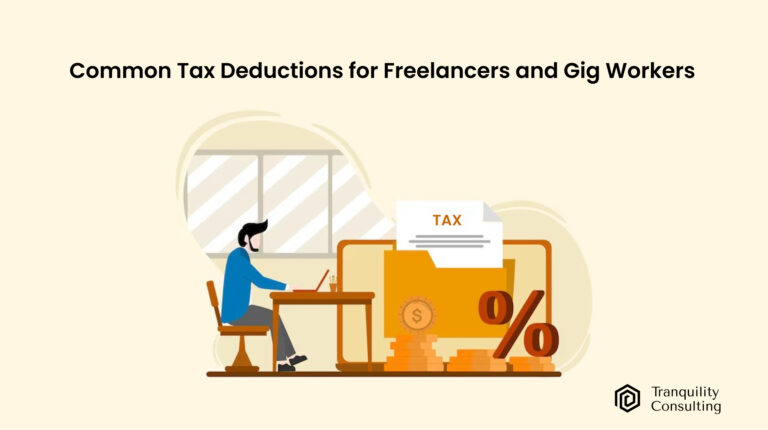Freelancing and gig work offer flexibility and autonomy, but they also come with unique financial responsibilities, especially regarding taxes. While traditional employees often have taxes withheld from their pay-checks, freelancers and gig workers must navigate quarterly tax payments and track numerous deductions independently. Understanding these Common tax deductions for freelancers can significantly reduce your taxable income and save you money. This blog covers the most common deductions available to freelancers and gig workers, helping you stay compliant and maximize your earnings.
Home Office Deduction
One of the most beneficial deductions for freelancers is the home office deduction. You may qualify for this deduction if you use a part of your home exclusively for business purposes. The space must be your principal place of business or where you meet with clients regularly.
There are two methods to calculate the home office deduction:
- Simplified method: Deduct $5 per square foot of your home office, up to 300 square feet.
- Regular method: Deduct a percentage of your home-related expenses, such as rent, utilities, and insurance, based on the rate of your home used for business.
Internet and Phone Bills
Freelancers and gig workers often rely on the internet and phone services. You can deduct the portion of your internet and phone bills used for business purposes. If you use these services for personal and business reasons, calculate the business use percentage and deduct that amount. For instance, if you use your phone for business calls 70% of the time, you can deduct 70% of your phone bill. Keep records of your business usage in case the IRS asks for documentation.
Vehicle Expenses
Many gig workers use their vehicles for business, whether delivering food, driving passengers, or running errands. You can deduct the expenses related to your vehicle use for business purposes in one of two ways:
- Standard mileage rate: Deduct 65.5 cents per mile driven for business in 2023.
- Actual expenses: Deduct the actual costs of operating the vehicle for business, including gas, repairs, insurance, and depreciation.
Self-Employment Tax Deduction
As a freelancer or gig worker, you must pay both the employer and employee portions of Social Security and Medicare (self-employment taxes). However, the IRS allows you to deduct half of your self-employment tax (15.3%) as an adjustment to income, reducing your taxable income. This deduction applies to your net earnings from self-employment, which are calculated after accounting for business expenses and deductions. Remember that this deduction is only for income tax purposes and does not reduce your self-employment tax.
Business Supplies and Equipment
Any items you purchase for your business can be deducted as business supplies or equipment. This includes everything from office supplies like pens and paper to more significant investments such as computers, cameras, and furniture. If the equipment you purchase has a useful life of more than one year, you may need to depreciate the expense over several years rather than deduct the total cost in the year of purchase. However, the Section 179 Deduction allows you to deduct the total cost of qualifying equipment in the year it’s purchased.
Health Insurance Premiums
Freelancers and gig workers who pay for their health insurance may be able to deduct the premiums for themselves, their spouse, and their dependents. You must not be eligible for an employer-subsidized health plan (either through your employment or your spouse’s) to qualify. This deduction is particularly beneficial for self-employed individuals, helping reduce the cost of healthcare.
Marketing and Advertising Expenses
Any money you spend to promote your freelance business is deductible as a marketing and advertising expense. Whether building a website or paying for ads, these costs can reduce your taxable income and are considered ordinary and necessary business expenses. This includes:
- Social media ads
- Website hosting and design
- Business cards
- Development Expenses
Educational Expenses
If you take courses, attend workshops, or buy materials to improve your skills or knowledge related to your business, you can deduct these educational expenses. For example, that expense is deductible if you’re a freelance graphic designer and take an online course to learn new design software. The IRS allows deductions for education that either maintains or improves your current skills related to your business. However, education that qualifies you for a new profession is not deductible.
Professional Services
Freelancers often hire accountants, bookkeepers, or legal professionals to help with tax filing, contract review, and financial planning. Fees paid for these professional services are deductible as business expenses. Additionally, if you use software for bookkeeping or tax preparation, the cost of those subscriptions can be deducted. Hiring professionals ensures you comply with tax laws and can help you uncover additional deductions, ultimately saving you money in the long run.
Retirement Contributions
Freelancers and gig workers can contribute to tax-deductible retirement plans like a SEP IRA or Solo 401(k). These plans’ contribution limits are higher than traditional IRAs, allowing self-employed individuals to save more for retirement while reducing their taxable income. For example, in 2023, you can contribute up to 25% of your net earnings to a SEP IRA, up to a maximum of $66,000. Contributions to these plans are deductible, allowing you to save for retirement and reduce taxes simultaneously.
Tax Deductions for Gig Workers
Gig workers, like freelancers, can take advantage of various tax deductions to lower their taxable income and save money. Common deductions include the home office deduction, which allows you to write off a portion of your rent, mortgage, and utilities if you work from home, and vehicle expenses, which can be deducted if you use your car for business purposes. You can claim the standard mileage rate or vehicle costs like gas and maintenance. Additionally, gig workers can deduct business supplies, marketing expenses, and self-employment taxes, helping to reduce their tax burden. Keeping detailed records of all business-related expenses is crucial to claiming all eligible deductions. By taking advantage of these deductions, gig workers can significantly lower their tax liability and keep more earnings.
Conclusion
Understanding the common tax deductions for freelancers is essential for managing your business finances effectively and minimizing tax liability. From home office expenses to health insurance premiums and retirement contributions, each deduction helps reduce your taxable income and allows you to keep more of your hard-earned money. Be sure to maintain accurate records and receipts for all your business-related expenses. Consider consulting with a tax professional to ensure you take advantage of all available deductions and comply with IRS regulations. Proper planning allows you to focus on growing your freelance or gig work business without the added stress of tax season.
FAQs
1. Can freelancers deduct business meals?
- Yes, freelancers can deduct 50% of business meal expenses if the meals are directly related to the business.
2. How do I claim the home office deduction as a freelancer?
- Using the simplified or regular method, you can calculate the deduction based on the portion of your home used for business purposes.
3. Are vehicle expenses fully deductible for gig workers?
- You can deduct the standard mileage rate or vehicle expenses, but only for the portion used for business purposes.
4. What is the self-employment tax deduction?
- Freelancers can deduct half of their self-employment tax from their taxable income, reducing their overall tax burden.
5. Does Tranquility Consulting offer tax assistance for freelancers?
- Tranquility Consulting provides expert tax consulting services, including tax filing and deduction optimization for freelancers.
If you have any questions or need business-related tax consulting advice, please contact us at: [email protected]





